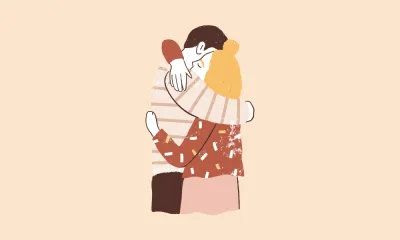Just when you think you're making progress, your partner retreats into their shell again. You’re often left wondering what you did wrong, and your efforts to fix things only seem to push them further away.
Never knowing where you stand with someone isn't easy. You might even wonder why you're sticking around when your needs aren't being met. If this sounds like your relationship, your partner might have an avoidant attachment style.
Attachment styles refer to how we relate to others emotionally. Because of emotional neglect in their early life, your partner might fear intimacy and be deficient in the skills needed to maintain a healthy intimate relationship.
It might not be that they don't love you—they may just express it differently.
Things to know
- Avoidant behavior is caused by insecurity that develops in childhood.
- Avoidants still yearn for emotional connection.
- Even though avoidants have built up defensive mechanisms to make them feel safe, with time, support, and patience, they can have healthy relationships.
So, how do you tell if your avoidant partner loves you? To help you figure it out, here's what we'll be looking at:
- What Is An Avoidant?
- Two Types Of Avoidant
- Avoidants In Relationships
- 13 Signs Your Avoidant Partner Loves You
- What Attracts An Avoidant Partner?
- How To Make An Avoidant Feel Safe
- There’s Hope
What Is An Avoidant?

As children, we have a strong need to feel loved and appreciated. When we receive that affirmation, we grow up to be emotionally secure.
However, some children are ignored and disregarded by their primary caregivers, causing them to stop seeking closeness or expressing their emotions.
These children learn to put up emotional barriers and avoid intimacy, resulting in what is known as an avoidant attachment style. Therefore, avoidants are simply adults with an avoidant attachment style.
Two Types Of Avoidant
25% of adults have an avoidant attachment type. Although avoidance is generally marked by a reluctance to get close to others, love avoidants fall into two categories: dismissive and fearful.
Dismissive avoidant
Dismissive avoidants are fiercely independent and seldom see the value of romantic relationships. They prefer to be on their own, and when in a relationship, avoidants struggle to develop intimacy with their partners.
Due to core wounds developed in childhood, avoidants fear that emotional closeness will threaten their independence. It’s not uncommon for avoidant partners to put up walls and close themselves off when their partners attempt to get closer to them.
Fearful avoidant
Fearful avoidant attachment refers to ambivalence about intimacy and relationships. Despite longing for romantic relationships, childhood trauma has left them fearful that romantic partners will abandon or hurt them.
Much like individuals with an anxious attachment style, fearful avoidants tend to feel undeserving of close relationships. Suppressing their emotional needs eventually leads to emotional outbursts and troubled relationships.
Avoidants In Relationships

Interdependence and autonomy must be balanced in intimate relationships. When one partner consistently creates distance and maintains a position of autonomy, intimacy suffers. Naturally, this is why relationships with avoidants are so difficult to sustain.
Avoid intimacy
Partners with an avoidant attachment style tend to feel overwhelmed by intimacy. As such, they create distance between themselves and their romantic partners. They also tend to distract themselves with other activities outside the relationship.
These activities may include addictions that are harmful to them and their partners. This often results in strained relationships where partners feel hurt, neglected, and abandoned.
Avoidants tend to get absorbed in their own affairs, so it's easy to feel neglected or shut out by them.
Withdraw when things get serious
Initially, an avoidant might be swept up in the magic of the honeymoon phase. However, as a relationship matures and challenges them to step out of their comfort zone, their insecurities come to the surface.
Avoidants inevitably withdraw, leaving their partners to deal with everything alone. This perceived callousness is what makes most romantic partners consider walking away from an avoidant.
Struggle to articulate their needs
Due to past experiences, avoidants don’t anticipate that their needs will be met or that their feelings will be validated. As such, they lack the skills to articulate their wants and needs to their partners.
Eventually, these suppressed emotions reach a boiling point, forcing the avoidant to distance themselves. The further an avoidant drifts away, the more confused their partner feels.
A different view of affection
Although avoidants seem emotionally unavailable, they still yearn for deep connection. They desire affection but express it differently. For avoidants to be happy in their relationships, romantic partners need to respect their need for autonomy and space.
13 Signs Your Avoidant Partner Loves You

Here's how to tell if your avoidant partner loves you:
1. Subtle displays of affection
If your partner has an avoidant attachment style, they have a hard time expressing emotions and affection. Keep an eye out for subtle, nonverbal displays of affection. Body language such as extended eye contact, light touches, and gentle smiles are all signs that your avoidant partner cares about you.
2. They let their guard down
Avoidants maintain rigid boundaries to help them feel safe. When your partner starts to lower their boundaries, they feel comfortable with you. A willingness to let you in is a strong sign that your avoidant partner loves you.
3. They become more vulnerable with you
Opening up isn't easy for avoidants. But, when they start to feel secure, they allow themselves to be vulnerable. If your partner is gradually sharing their thoughts, feelings, and needs with you, they love you.
4. They share their interests with you

If your avoidant partner chooses to include you in something that they usually enjoy by themselves, it's a big deal. Avoidants are fiercely independent, and they tend to guard their interests just as much as their emotions.
If they're letting you into their world, they love you - so if they invite you to a concert or art class, be sure to see it as an invitation into their heart.
5. They want to get help
You know an avoidant partner loves you when they're willing to seek professional help for their attachment issues and work on their personal development. An even stronger sign that they care is if they're willing to see a couples therapist with you.
Discussing their feelings and emotions with someone will probably be uncomfortable and stressful, but they want to do it anyway.
6. They want to spend more time with you
Avoidants value solitude. Being alone makes them feel safe and allows them to charge their emotional batteries. So if they're making an effort to spend time with you, it’s a major sign that they're smitten.
7. They express their love in small ways

They may not exactly sweep you off your feet, but when an avoidant expresses love for you in small, understated ways, that’s a pretty big step. These small gestures push an avoidant out of their comfort zone. So if they’re trying, view it as a major win.
8. They put a label on things
Putting a label on things is scary for individuals with an avoidant attachment style. If they’re willing to make things official and call you their partner, they’re seriously into you. Additionally, telling family members and anyone who will listen that you’re together is another indicator that their feelings are genuine.
9. They want to commit
Avoidants avoid commitment, and the thought of being tied down scares them. In a bid to keep things casual, it's not uncommon for avoidants to keep their options open. If your partner has an avoidant attachment style but wants to experience a fully committed relationship with you, they love you.
10. They're serious about meeting your needs
If your avoidant partner is serious about you, they'll make an effort to meet your needs. It may not happen all at once, but over time you'll notice that they become more attentive and supportive.
11. They treat you differently

How does your partner navigate other adult relationships? How do they treat their close friends? How do they behave around their co-workers? Establish their baseline behaviors and see if there's a notable difference in how they treat you.
Avoidants tend to mask their fears quite well, so if your partner feels comfortable enough to show you who they are behind the mask, they have genuine feelings for you.
12. They try to bond with you
Being invited into an avoidant's world is significant, but when they want to join you in your world, too, that's a major breakthrough. Making an effort to bond with you is their way of showing you how much you mean to them.
13. They keep coming back to you
Avoidants have a habit of disappearing or withdrawing when things get intense. However, if your partner comes back to you and tries to make things right, they value your relationship.
What Attracts An Avoidant Partner?

While you can't change your partner, you can do things to attract them. Be warned: you've got to be willing to play the long game. Your goal should be to help your partner warm up to the idea of intimacy and in the long run it is possible the avoidant partner will chase you.
Don't try to control them
As they are so used to being independent, avoidant partners don't like to feel controlled. Trying to tell them what to do is likely to trigger their defenses. Plus, making them feel tied down or restricted can cause them to withdraw.
Respect their need for alone time
Instead of having a power struggle over your schedules, compromise and find a way to make the most out of your time. Focus on maintaining healthy boundaries. Strike a balance between quality time together and alone time.
Understand that your partner might need more alone time than you do. If you can show them that you love and accept them nonetheless, they'll feel safe with you.
Be more emotionally independent

Like most avoidants, your partner probably internalized from a young age that they needed to be independent to keep a primary caregiver happy. So, they might be reluctant to open up and experience stress or confusion when you try to. To them, you aren't supposed to be needy: you should be able to take care of yourself.
With this in mind, try not to rely on them too much for emotional support. Instead, expand your social circle and lean on them for support. You could also find healthy ways to self-soothe.
Learn to read them
If you need to have an important talk, pay attention to your partner's body language. Look for signs of agitation or anxiety. You might need to take a break and resume the talk later. Persisting when your partner has shut down will only make them defensive.
Validate their feelings
As your relationship develops, your avoidant partner might start to express their feelings more. It's important to validate your partner even when you don't agree with them. By showing them that their feelings are valid, you're helping them change the narrative.
Unlock His Hero Instinct
At the core of every man's psyche lies a powerful instinct that governs his responses and desires—the Hero Instinct. This innate drive compels him to feel valued, indispensable, and cherished in a relationship. If you're seeking to attract a male partner with an avoidant attachment style, you can still tap into this powerful instinct, creating a deep and meaningful connection.
"His Secret Obsession" is a valuable resource that can help you unlock the potential of the Hero Instinct, even when dealing with an avoidant partner. While the title may seem unconventional, the insights it provides are invaluable.
Understanding and applying the principles within can transform your connection and bring out the best in both of you.
This program delves into the secret signals that activate the Hero Instinct, even in individuals with avoidant tendencies. By utilizing these techniques, you can foster a sense of security and comfort that allows your partner to lower their emotional barriers. As a result, he'll be drawn to you like a magnet, unable to resist the profound bond that forms between you.
Whether you're currently in a relationship with an avoidant partner or seeking to start a new one, "His Secret Obsession" offers practical advice and strategies. It's an essential guide for any woman looking to enhance her connection with a partner who might initially be hesitant to fully embrace emotional intimacy.
How To Make An Avoidant Feel Safe

Attachment styles can change over time, and if you'd like to support your partner on their journey to a more secure attachment style, here's how to make them feel safe:
Create a safe environment
While your views, thoughts, and opinions are different, it's important to remain respectful. Show your partner that you accept them for who they are. The key is to compromise and find a middle ground. Doing so will create a safe space for your partner to express themselves.
Respect their differences
Your partner might not be comfortable expressing their feelings. So, it's important to be considerate of this to make them feel safe. Be patient and mindful of how they like to show and receive affection.
Give them space
Avoidants tend to get absorbed in their own affairs, so it's easy to feel neglected or shut out. However, it's crucial to show your partner that you respect their need for autonomy and space.
Reframe your statements
Simply changing how you say certain things can have a positive effect. Instead of asking your partner to stop doing something, tell them what you'd like them to do. Refrain from using harsh criticism and focus on positive reinforcement. This will go a long way in making your relationship a safe space.
There’s Hope
Remember, attachment styles are not fixed. With support and patience, an avoidant partner can embrace emotional intimacy.
Discover the Truth with Relationship Hero
Navigating a relationship with an avoidant partner can be challenging, especially when trying to decipher their feelings. If you're looking for support and guidance in understanding the truth about your relationship, consider reaching out to the relationship experts at Relationship Hero. They specialize in helping individuals with issues related to attachment styles, mixed signals, and building attraction.
I found great insight and clarity in working with the coaches at Relationship Hero. They helped me understand the dynamics of my relationship and provided practical advice for improving communication and deepening the connection with my partner. The experience was transformative and I felt more confident and empowered in my relationship after working with them.
If you're ready to discover the truth about your relationship, take the first step by taking their relationship quiz to assess your current situation. With Relationship Hero's online coaching services, you can get the personalized support you need, at your own pace and from the comfort of your own home.









